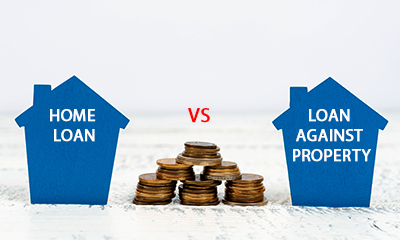Home Loan vs Loan Against Property: Key Differences

Home Loan vs Loan Against Property: Key Differences
Home loans and loans against property are types of loans that often confuse borrowers. While they may sound similar, these are two distinct loans. While home loans are secured loans obtained by individuals to purchase a residential property, a loan against property is a multi-purpose loan that individuals secure using the real estate they own as collateral. Both loans could suit different purposes and have different advantages and properties. Read on to learn more about home loan vs loan against property.
Understanding Home Loans
A home loan is an amount borrowed from a financial institution, such as a housing finance company, to purchase a new or resale home, build a home, or renovate or extend an existing one. Most home loans allow financing up to 80%–90% of the house's market price. The lender will keep the house until you have fully repaid the loan. However, there are some eligibility criteria that you should meet.
Home loan eligibility criteria
Eligibility criteria for home loans may vary across different lenders. But below are the most common terms.
-
The applicant's age is a major factor in determining home loan eligibility. Salaried individuals have an age limit of 21 to 65 years. The age range for self-employed individuals is 21 to 65 years.
-
Minimum salary: Rs.10,000 per month.
-
Minimum business income: Rs. 2 lakh per year.
-
Maximum loan term: 30 years.
-
The applicant's current and future income significantly impact the loan amount.
-
A clean repayment history is considered positive.
-
Other financial obligations include existing liabilities such as a car loan or credit card debt.
Types of home loans
Home loans are categorized based on the interest rate structure.
-
Fixed-rate home loans have a set interest rate for the entire loan term, providing stability in monthly payments.
-
Floating-rate or adjustable-rate home loans (ARMs) have interest rates that fluctuate periodically based on market conditions, resulting in varying monthly payments.
-
Hybrid loans combine features of both, offering an initial fixed-rate period followed by a floating rate.
Each option has advantages and disadvantages, so borrowers should carefully evaluate their financial situation, future plans, and risk tolerance when choosing a home loan.
Now, let us understand loan against property in detail to compare home loan vs loan against property better.
Understanding Loan Against Property (LAP)
A loan against property (LAP) is a secured loan against an asset presented as collateral. This asset could be owned land, a residence, or any other commercial property. The asset remains collateral with the lender until the entire loan against the property is repaid.
LAP Eligibility criteria
Similar to home loans, eligibility criteria for LAPs could vary between lenders. But below are some common norms.
Loan Against Property Eligibility for Salaried Individuals
-
Their age should be at least 21 years or above at the time of loan application but under 65 years at the time of loan retirement.
-
Their proof of income is above Rs. 1.8 LPA.
-
They also need to furnish profits of the past two years of business and a record of at least three years of business.
Loan Against Property Eligibility for Self-Employed Individuals
-
Applicants should have an income above Rs. 40,000 per month and must be working for the past 2-3 years.
-
The applicant should be at least 18 years or above at the time of application but under 60 years at loan retirement.
-
Sanction of the loan is at the discretion of the bank.
Types of LAP
LAP can be categorized based on the type of property used as collateral.
-
Residential LAP is secured against residential properties such as houses, flats, or apartments.
-
Commercial LAP is secured against commercial properties like office spaces, shops, or industrial units.
-
Rental income-based LAP is designed for individuals who earn rental income from their properties, where the loan amount is determined based on the rental yield.
Each type has its own eligibility criteria, interest rates, and loan-to-value ratios. Borrowers should carefully evaluate their requirements and property type before opting for a specific LAP variant to ensure a suitable financing solution.
Home Loan vs Loan Against Property - Major Differences
Home Loans are purpose-specific for purchasing/constructing a residential property, while LAP provides end-user flexibility. Below are the major differences between home loan vs loan against property.
Parameter
Home Loan
Loan Against Property (LAP)
Loan Purpose
Specifically for the purchase/construction of a residential property
It can be used for any purpose except speculative investments
Loan Amount & Tenure
- Loan amount up to 90% of property value - Tenure up to 30 years
- Loan amount 55-70% of property value - Tenure up to 20 years
Interest Rates
Generally, lower interest rates
Higher interest rates compared to home loans
Tax Benefits
- Principal repayment up to Rs. 1.5 lakh exempted under Section 80C - Interest paid on home loan exempted under Section 24(b)
No specific tax benefits unless used for permitted purposes (e.g., interest exemption under Section 24(b) if used for rental property)
Risk of Property Loss
Property purchased using the home loan is at risk in case of default
Residential property used as collateral is at risk in case of default
FAQs
Can I use a home loan for purposes other than buying a house?
No, home loans are specifically designed to purchase or construct a residential property. If you require funds for purposes other than acquiring a home, you should consider alternative options like a personal loan or a loan against property (LAP)
Is the entire property value financed by the lender in a loan against property?
No, lenders typically finance only a portion of the property's value in a loan against property. The loan-to-value (LTV) ratio is the maximum amount that can be borrowed against the property's market value.
Conclusion - Home Loan vs Loan Against Property
Borrowers should carefully assess their requirements, eligibility criteria, and risk appetite to determine the most suitable option between a home loan and a loan against property. Explore Aadhar Housing's wide range of home loan solutions and loan against property offerings to seamlessly fulfill your housing and financial needs.
- Aadhar Housing Finance has been awarded and recognised as ‘The Best Brand 2021’ at the 4th Edition of ‘The Economic Times – Best Brands 2021’ held at Sahara Star in Mumbai on 21st December, 2021.
- Aadhar Housing Finance was conferred with the 'CSR Times Award 2021' for the successful initiatives implemented under its CSR project, ‘Aayushmaan Aadhar’ at the 8th National CSR E-Summit, on 17th December, 2021.
- Aadhar Housing Finance was conferred with 'India CSR Leadership Award 2021' on 10th Dec, 2021 in 'Community Health' category for its impactful community-centric initiatives conducted under Aayushman Aadhar project.
- Aadhar Housing Finance has received ‘Maharashtra State Best Employer Brand Award, 2021’ at the 16th Employer Branding Awards hosted on 23rd Nov, 2021 by World HRD Congress for our exemplary work in HR. Aadhar has translated and combined vision with action leading to better people strategies and cultivation of competencies in order to enable the organization to be future ready.
- Aadhar Housing Finance Ltd bagged 5 awards across below categories at ‘Banking Frontiers NBFC Awards & Conference 2021’ (DNA Awards 2021) virtual summit held on 20th Aug, 2021. 1) Best Cyber Security Initiative - 1st Prize 2) Best API Initiative - 1st Prize 3) Best Omnichannel CX Initiative - 2nd Prize 4) Best Cloud Initiative - 2nd Prize 5) Esteemed Trophy (IT & Digital Group)
- Awards & Recognition: We received two prestigious awards at the 7th Edition of ‘National Awards For Excellence in BFSI 2021’ which was held virtually on 26th Aug 2021, in mentioned categories: 1) Aadhar Housing Finance Ltd received the ‘Affordable Housing Finance Company of the Year’ award, 2) Shri Deo Shankar Tripathi, MD & CEO, Aadhar Housing Finance Ltd has was conferred with ‘CEO of the Year’ award.
- Awards & Recognition: For the Second consecutive year, Aadhar Housing Finance has been certified as a ‘Great Place To Work’ by Great Place To Work Institute, a Global authority on recognizing high-trust and performance driven culture at workplaces.
- Awards & Recognition: Aadhar Housing Finance is certified as a ‘Great Place To Work’ by Great Place To Work Institute (India). This is a significant milestone for Team Aadhar as ‘The Great Place to Work Model’ is the world’s most researched, accepted and sustainable definition of a great workplace from an employee’s point of view. It is a comprehensive framework encompassing the overall employee experience ecosystem.
- Awards & Recognition: Aadhar Housing Finance won for the 3rd year in a row at The Outlook Money Awards. Team Aadhar received the Silver award in the Affordable Housing category at the Outlook Money Conclave held in Mumbai on 27th Feb, 2020.
- Awards & Recognition: Shri Deo Shankar Tripathi, MD & CEO, Aadhar Housing Finance received the ‘Top Most Influential BFSI Leaders’ award at the World BFSI Congress & Awards, in Mumbai on 14th Feb 2020.
- Awards & Recognition: Shri Deo Shankar Tripathi, MD & CEO, Aadhar Housing Finance received ‘the NBFC Leadership Award 2020’ at the 8th NBFC 100 Tech Summit held in Mumbai by Banking & Finance Post and Elets on 23rd January 2020.
- Awards & Recognition: The Aadhar Annual Report 2018-19 wins all India 3rd Prize in the PRSI National Awards 2019 at the 41st All India Public Relations Conference – Hyderabad
- Awards & Recognition: Aadhar Housing Finance is one of the ‘Best BFSI Brands 2019’: Aadhar Housing Finance received ‘The Economic Times Best BFSI Brands 2019’ award at the India-UAE Strategic Conclave 2019 held in Dubai on 15th October, 2019
- Awards & Recognition: Aadhar Housing Finance received ‘The affordable Home Loan Provider Of The Year 2018’ award from Union Minister Shri Nitin Gadkari at Outlook Money Conclave in Mumbai on 12th March, 2019 for the exemplary work in supporting the ‘Housing for All’ mission in India.
- Aadhar Housing Finance received the Prestigious ‘PMAY Empowering India Award 2019’ from Union Minister Shri Hardeep Singh Puri in Delhi on 5th March, 2019 for its exemplary work in supporting the ‘Housing for All’ mission in India.
- Dun & Bradstreet included Aadhar Housing Finance in 'India's Leading BFSI Companies 2019' list. The report was published by Dun & Bradstreet Information Services in March, 2019.
- Aadhar is declared one of the 1) ‘DREAM COMPANIES TO WORK FOR’ (Financial Services) and 2) ‘DREAM EMPLOYER OF THE YEAR’ presented by ET Now on 16th Feb, 2019 at the World HRD Congress in Mumbai.
- Shri Deo Shankar Tripathi, MD & CEO, Aadhar Housing Finance was recognized and felicitated as one of ‘100 Top Most Influential BFSI Leaders’ at the ‘World BFSI Congress’ held in Mumbai on 14th Feb, 2019.
- Aadhar Housing Finance bagged the ‘Most Promising Brand For Housing Finance’ award at the ‘World BFSI Congress’ presented by ET Now in Mumbai on 14th Feb, 2019.
- Aadhar Housing Finance won ‘Prestigious Brands of India 2019’ award at the conference held at Sahara Hotel in Mumbai on 12th Feb, 2019. The list of prestigious brands was judged and presented by BARC (Brand Advertising Research and Consulting), a global brand consultancy firm and ERTC Media, one of India’s leading independent media consulting & brand listing organisations. The recognition solidifies Aadhar as a leader within housing finance segment across various parameters such as brand recall, impact, trust, positioning, growth, reach, and innovation.
- Aadhar Housing Finance won the prestigious Finnoviti 2019 award at ‘Finnoviti Awards & Conference’ presented by Banking Frontiers and their Knowledge Partner Deloitte in Mumbai on 25th January, 2019 for innovative distribution and referral model named ‘Aadhar Mitra’.
- Aadhar Housing Finance bagged 2 prestigious awards at the ‘Banking, Financial Services & Insurance Awards’ presented by ABP News in Mumbai on 28th November, 2018:
- Housing Finance Company of the Year (Medium and Small) – for our exemplary work in the affordable housing finance segment.
- Marketing Campaign of the Year – for our recent brand campaign #GharBanegaTohDeshBanega.
- Aadhar MD & CEO awarded the ‘BFSI Leadership Award’ in Nov 2018 by ‘The Banking and Finance’ magazine and ‘elets’.
- Aadhar MD & CEO awarded the ‘Certificate of Excellence’ under “30 most innovative Business Leaders to watch in 2018” in July 2018 by ‘The CEO Magazine’.
- Aadhar receives the Award as the “Best Affordable Home Loan Provider of the Year 2017” at the ‘Outlook Money Awards’ March 2018.
- Aadhar CEO receives the ‘Inclusive Business Leaders Award’ from International Finance Corporation (IFC) for Aadhar’s exemplary work in Inclusive Business at the 2012 Inclusive Business Leaders Forum in Tokyo, Japan.
Report










